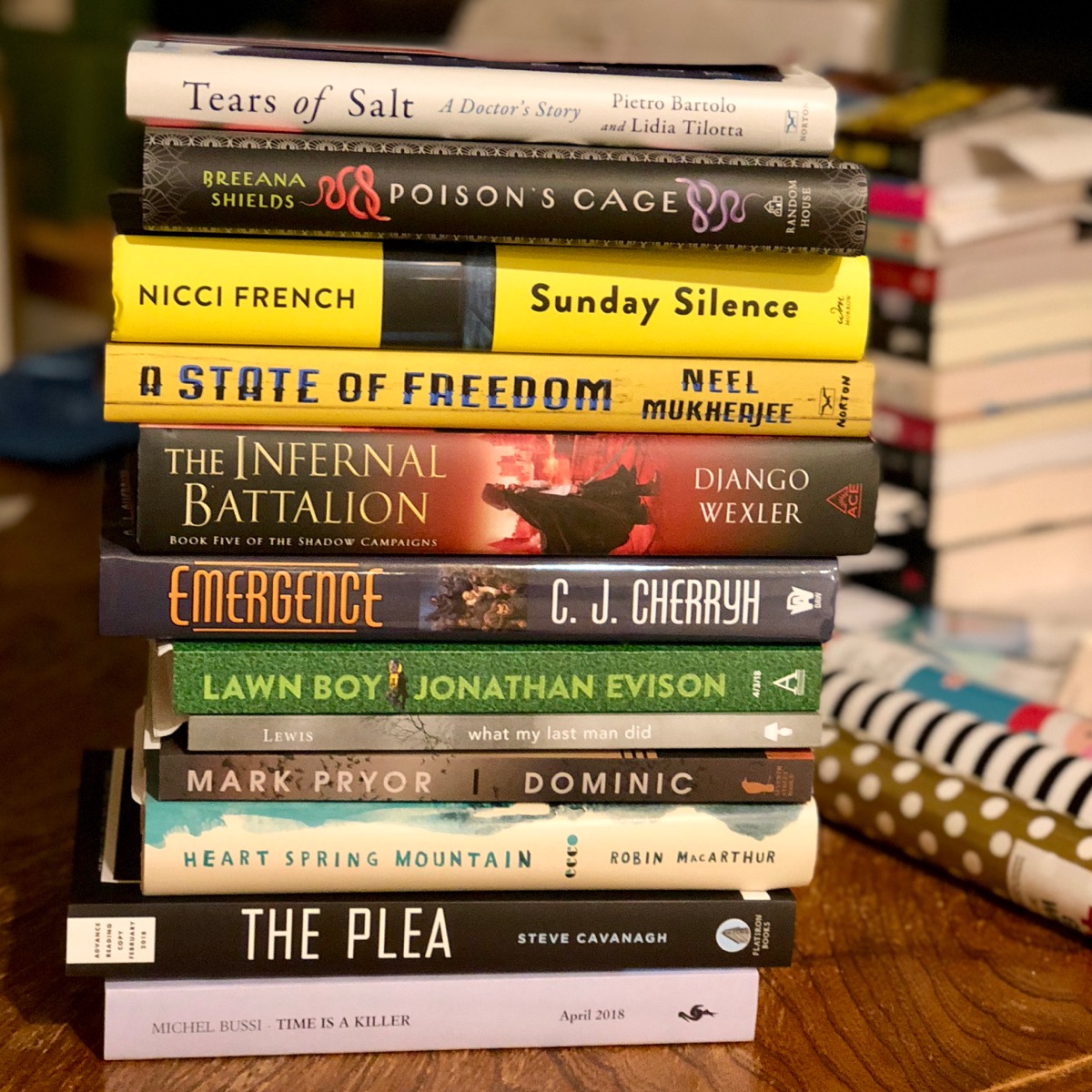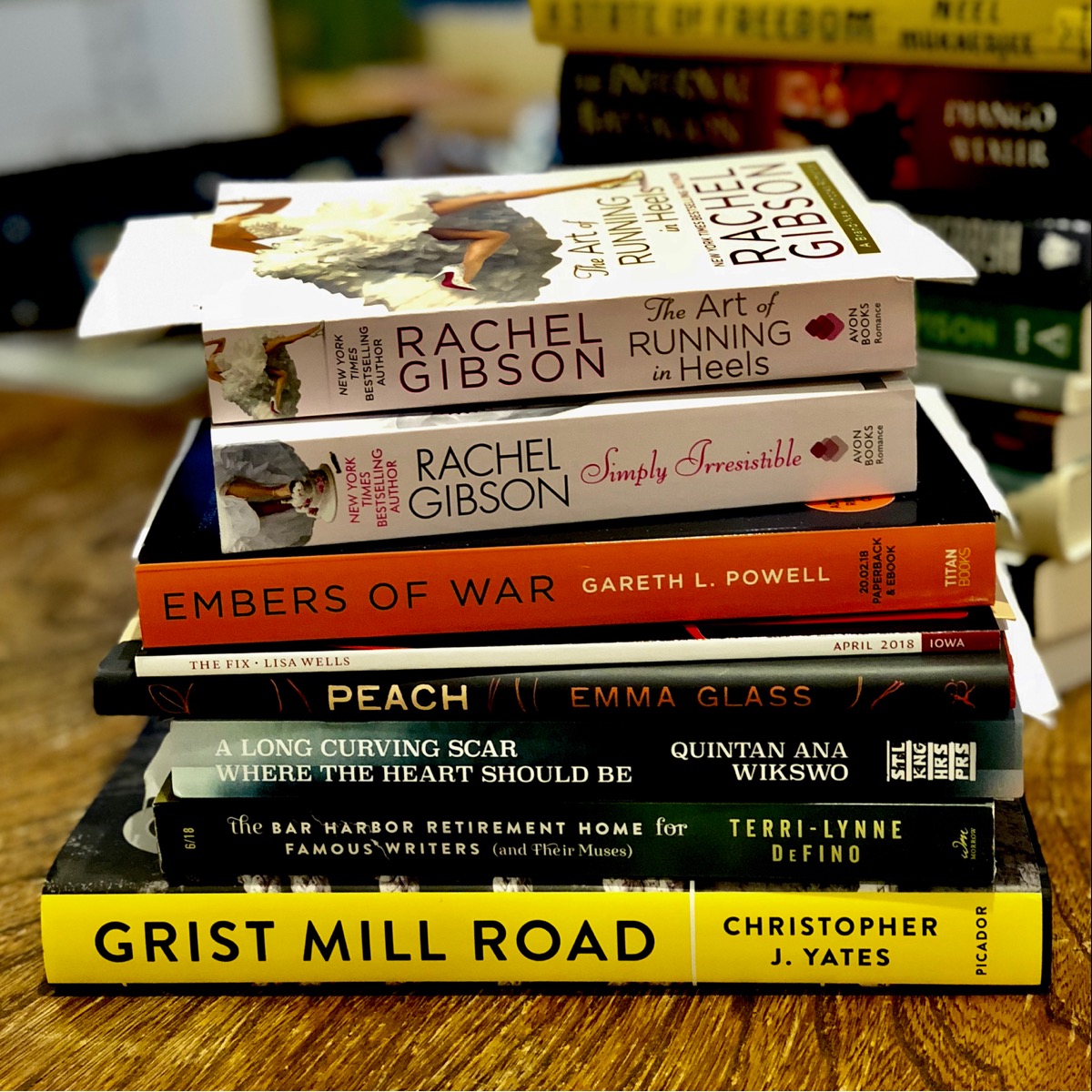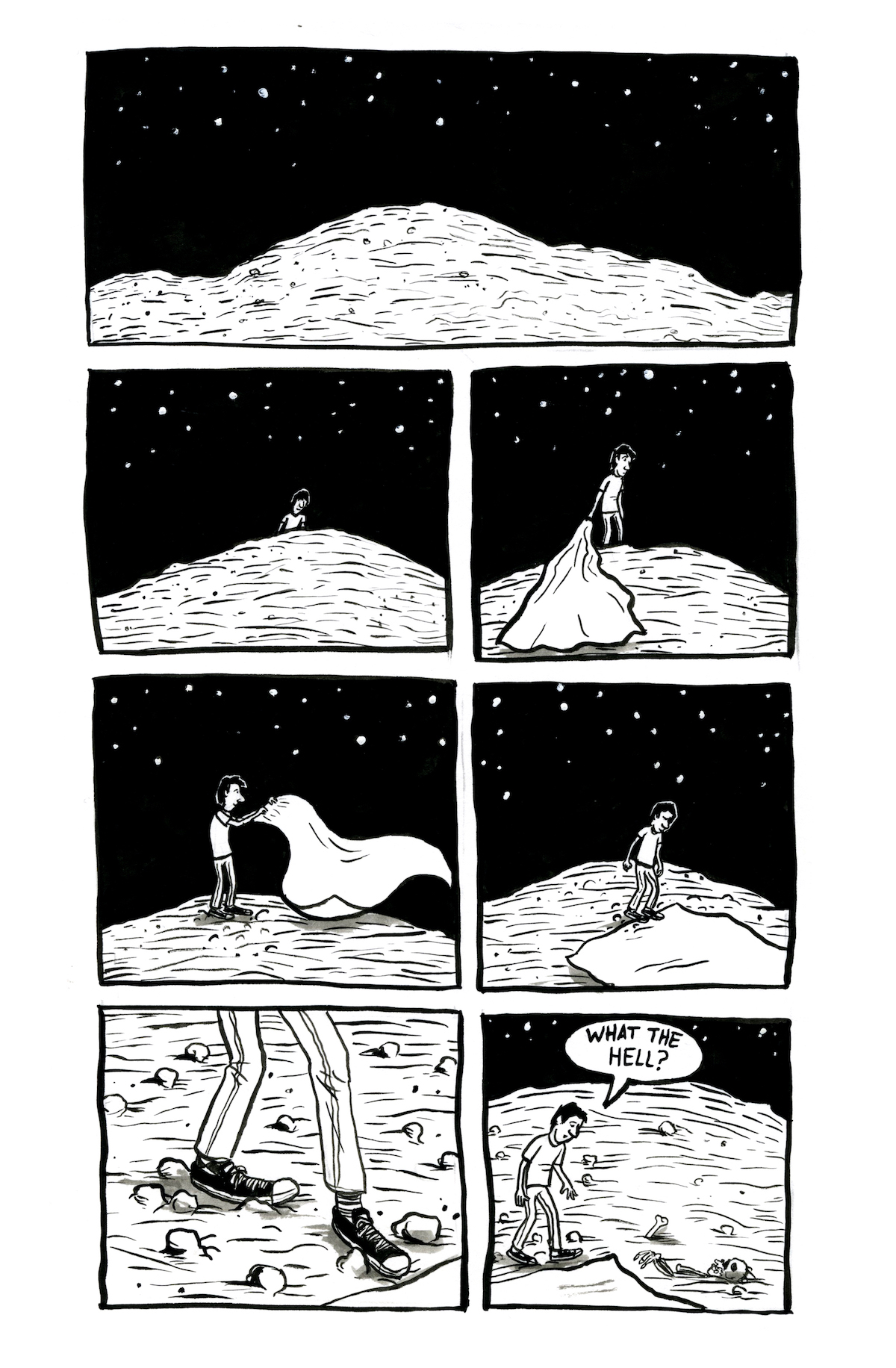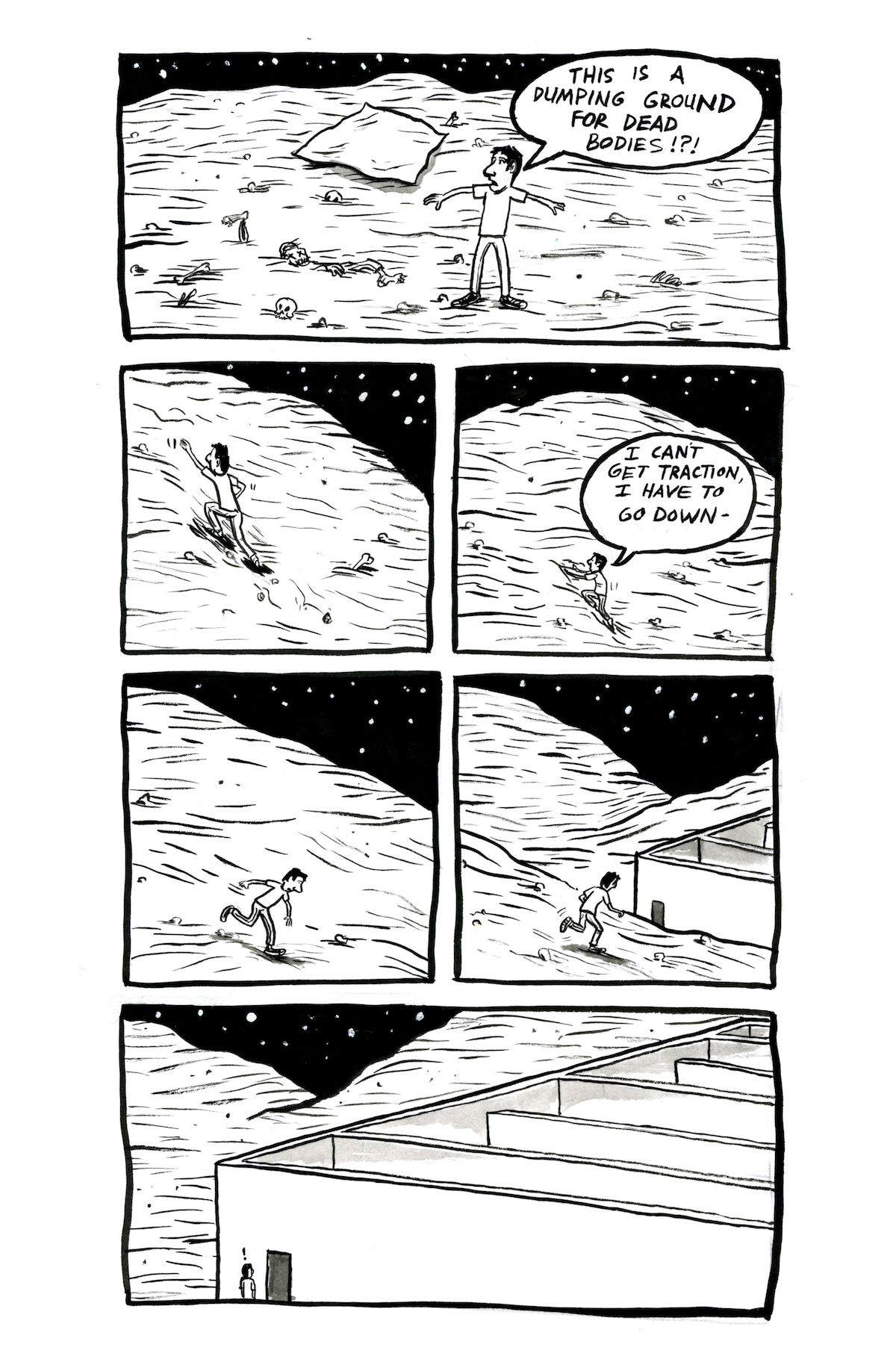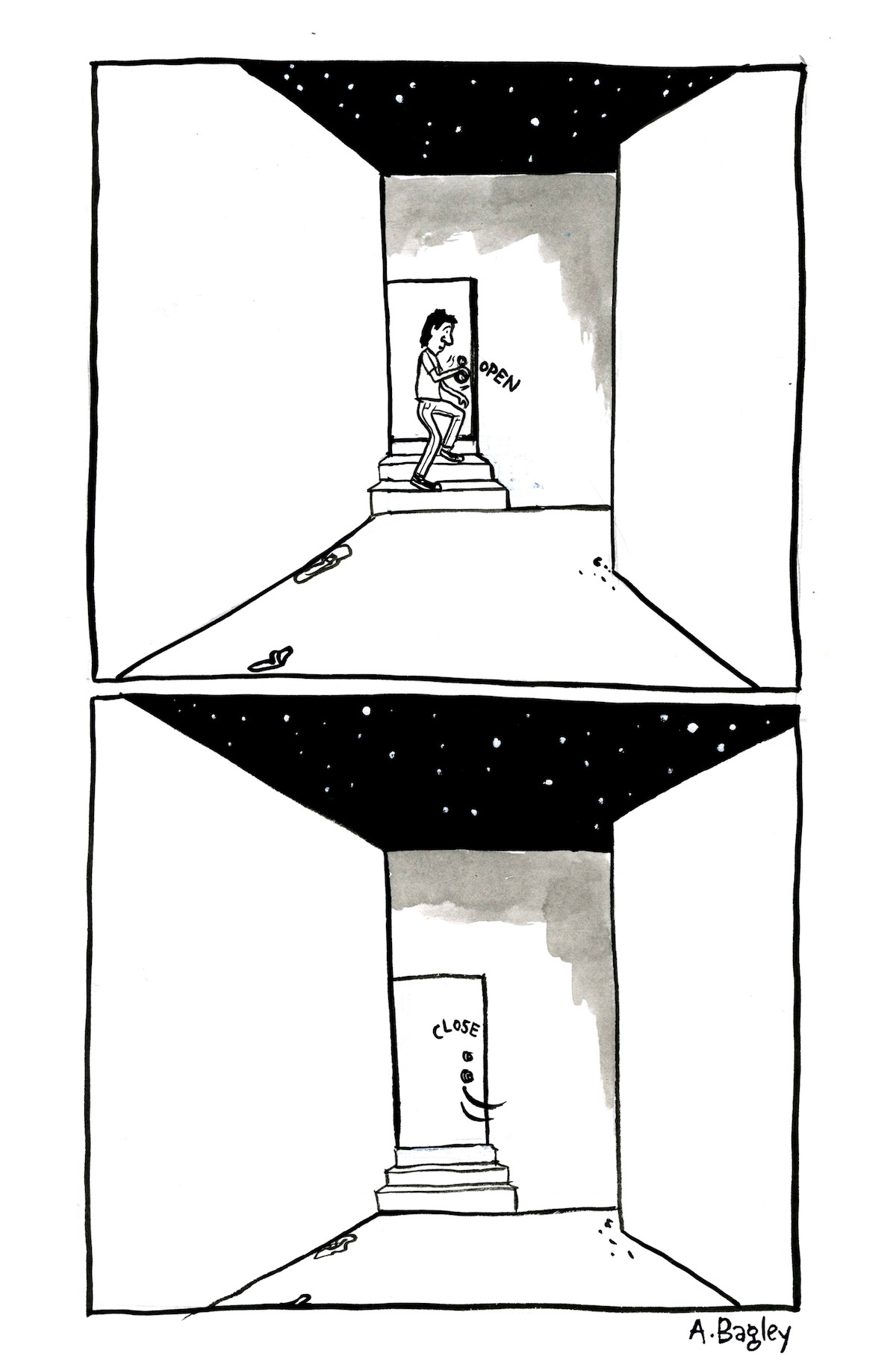When I finally get that claw-footed tub
and sink into her smooth white hollow
run the pads of my hands along
her cool slopes admire the curves
that cradle my naked skin
as the water runs I’ll stick my toe
into that brass faucet and accept
a spray of water sifting
over my thighs and shins like sugar
the heat a rising redemption
misty and heaven-bound as water
folds over my hips my belly
the rising and falling of my chest
buoyant with each exhalation this rest
quiet above a porcelain body
Grab tickets fast to workshop "Calypso" with David Sedaris

There’s more information on our sponsor’s page, or you can buy tickets here. Act now; two of the dates are already sold out, and last year they went faster than hotcakes.
Many thanks to Northwest Associated Arts for sponsoring the site this week. If you're interested in doing the same — and putting your book or event in front of our readers, while supporting some of the best writing about books in the city — check out available dates in 2018. Like Sedaris, we sell out quickly, so make sure you're on the calendar now.
Your Week in Readings: The best literary events from December 25 - December 31
Monday, December 25:
Merry Christmas to all, and to all a good et cetera, et cetera.Tuesday, December 26: Family Story Time
Ballard’s branch of the Seattle Public Library welcomes all the families who are totally sick of each other after spending the last two days together to join them for “an evening of stories, songs, and a simple craft.” Seattle Public Library, Ballard Branch, 5614 22nd Ave NW, 684-4089, http://spl.org, 6:45 pm, free.Wednesday, December 27: Garth Stein’s Book Club
See our Event of the Week column for more details. Third Place Books Seward Park, 5041 Wilson Ave S, 474-2200, http://thirdplacebooks.com, 7 pm, free.Thursday, December 28: Winter Craft Extravaganza
The Queen Anne branch of Seattle Public Library invites families to join them for “books, snacks, and wintry crafts! All ages welcome!” Seattle Public Library, Queen Anne Branch, 400 W Garfield St, http://spl.org, 2 pm, free.
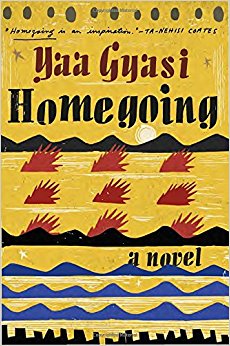
Friday, December 29: Afternoon Book Group
If you’re looking for some purpose for your post-Christmas week, maybe you should try joining this free book club at the Greenwood branch of the library. They’re going to be discussing the brilliant novel Homegoing, by Yaa Gyasi. There’s a lot to discuss in this book — and it’s relatively thin, too, meaning you’ll be able to read it in the days leading up to the book club. Go meet some folks who love books. Seattle Public Library, Greenwood Branch, 8016 Greenwood Ave N, http://spl.org, 2 pm, free.Literary Event of the Week: Garth Stein's Book Club

Tonight’s book club will discuss Brit Bennet’s debut novel, The Mothers. It’s about a young woman whose mother commits suicide. Shortly afterward, she discover that she’s pregnant. The Mothers is the story of cycles of heartbreak and loss and acceptance and all the shit that mothers hand down to their daughters, whether they intend to or not.
Because it’s a novel about Black protagonists, The Mothers might have been shelved in the “African-American Literature” section of a Borders, had it been released fifteen years ago. But the acclaim for this book is universal, and the themes are compelling to anyone who has ever been a part of a family. This is a book that succeeds on its own merits, one of those rare universally acclaimed novels that’s actually worth the hype.
Why not let Stein walk you through The Mothers and explain why the book works so well on so many levels? This is basically a master class in reading and writing, all for the low, low price of entirely free.
Third Place Books Seward Park, 5041 Wilson Ave S, 474-2200, http://thirdplacebooks.com, 7 pm, free.
Rip it out with your hands
They talked Carol into dropping by. His coworkers met at the tavern once a week after their shift. The Graveyard Ghouls, they called themselves, and one of them even had patches made up, about three inches round, with a melting ghost face amidst a field of flame, clutching a wrench in its teeth. Carol wanted nothing to do with them normally, but agreed to stop in on account of it being Christmas Eve.
A crow, claws clicking with agitation on the flashing of the squat single-story tavern, drew his attention. He stopped and watched it pulling at a string of colored lights, useless and dim in the overcast morning. It cocked his head and looked at him, then hopped backward and disappeared, behind the roof lip.
He did not particularly want to be here. But since complete anonymity was impossible, and people talk if you're too standoffish, it made sense to make an effort to show up. Rude people stand out, he knew. But boring people? — and Carol was very good at being boring — boring people were ignored.
He pushed open the heavy weathered door, a porthole at his eye-level caught a neon sign as a flash of red in his peripheral vision. Inside, a dozen of his coworkers huddled at a grouped set of tables. Aside from the owner, who was leaning on the bar and looking at his phone, the only other soul in the place was a young man with greasy hair, wearing an armless jeans jacket over his leather, club insignia on the back — a fist holding a red heart, and above and below it, the words "Rip it out with your hands." He was playing video poker, and the screen made a flickering glow on his unshaven face. There was something about him Carol found curious, but someone called his name, and he walked over to his coworkers and took an open chair.
They knew better to ask Carol if he wanted a drink, and Betty even politely moved a pitcher from in front of him when he sat. Jack passed him a pint glass of water, but it smelled of bleach and he didn't drink.
"You got plans?" Betty asked him. He could smell the beer on her breath, her voice rough from years of smoke.
"No," said Carol. "Wish they'd run the line Christmas Day. Get some overtime."
"I hear that," Betty said. "I'd work this year. I'm alone, my daughter's in Mexico. Can you believe it? Mexico. She's texting me pictures from a beach. Trying to drive me mad. She knows I can't travel. I had this operation on my eye. Got a bubble in there, if I fly? Pow. Bursts open. I go blind. It's the pressure change in the cabins. No beach in the world worth that, but that little jerk still taunts me all the day long."
"Hmmm," Carol said.
"Well, I hope you have a Merry Christmas," she said.
"Likewise."
She tipped her beer to him, and he reciprocated with his water, then sat it back down without bringing it to his lips.
He stayed for thirty minutes, picking his moment when Betty and that raven-haired drunk whose name he could never keep went out back for a cigarette.
He visited the bathroom, and while washing his hands, he heard the women's voices through a cracked window.
"...never seen him with a woman?" That wasn't Betty, so must be black hair.
"I've worked with the man for ten years, never seen a ring or heard him talk about a soul. Never caught him stealing a glance, neither."
"So he's got some tinsel on his tree. Big whoop."
"I guess you never know, but that don't read right either," said Betty."
"Well, he's off somehow. Something about him isn't square."
"Oh, don't say that."
"You feel sorry for him."
"Well, he ain't bad looking, I'm sure he could have a friend if he wanted."
"Honey, I think the last thing that man wants is any kind of friend."
"I guess that's what got me curious, right? Who the hell doesn't want friends?"
The rain was starting as he crunched across the gravel of the parking lot. The video poker guy was straddling his bike, a skullcap helmet fit tight. He kicked the starter, arms high, gripping ridiculous ape hangers. The engine turned, and Carol could feel the thrum up from his feet. It hit his gut and made him nauseous. He watched the man ride away, the machine throwing a wake of cascading sound waves for nearly a minute as it cruised down the highway.
It pulled up something for Carol, something that made his heart beat mad, a memory of a rider. That obscene sound. "Loud pipes save lives" a voice repeated in his head, and he saw those steel toed black leather boots, and remembered a broken rib and difficulty breathing. Gravel of a parking lot tearing at his cheek. Chains rattling. Too drunk to know what was going on. Too drunk to remember a decade or so, frankly. But he wasn't too drunk to remember one thought: "I deserved it."
Traffic was confused, jumpy, and frustrated with people needing to get their last bit of shopping done. Carol stopped at the market, standing in line behind some Martha Stewart with cart brimming: fixings for pie, a large ham, whipped cream, and nearly twenty bottles of wine. Just as her turn came up, she turned to him and squeaked "so sorry!" And then ran off to retrieve something or another she forgot.
In his basket, a steak, some potatoes, some spinach to wilt, a six pack of Coke. A hunting magazine. He waited without complaint until she came back, but turned his face away from her when she tried to apologize.
He was home before noon. He decided to stay up and just sleep the night like he was a normal person. He rarely inverted his schedule, but there was something about Christmas that pulled a little bit of childhood hope from his bones. Something about the stillness and quietness of the day appealed to him, how there was never much traffic, and nobody came calling, and the world was just as quiet as it ever got. He liked being awake for that.
It was during dinner when the power went out. He was watching a poker championship match, and just as a player was about to win a huge pot, hung on a ballsy bluff, darkness came down as if he had suddenly lost his vision.
He aimed his large Maglite at the ceiling in the kitchen and washed the dishes while there was hot water in the tank. He brushed, and then put himself to bed early.
The rain started. It fell on his under-insulated roof and made an even patter he found soothing. He lay there, cars on the windy road beside his building splashing a glow in his room, the rain a loping drum.
For the first time in a long time he thought about his mother, who perhaps Betty recalled just a bit, in her voice or manner of talk. Just enough to tease at the edge of recognition, and Carol understood why, besides the alcohol or her just being a woman, he didn't trust her.
He picked up his flip phone and pulled up the little weather app. It reported strong rain non-stop for the next twenty-four hours at least. He turned on an AM talk radio station, paranoid chatter about conspiracies.
Then, there, what was that? He turned off the radio to hear that motorcycle sound, a Harley driving down the road. His pulse quickened, and he listened for it to turn into his parking lot, for the sound to change as it drove under the carport and the engine to reverberate in a different way.
But it was just another bike passing in the night, and soon the sound was faded on the wind, and he could hear the water falling on the roof again. He lay for a while, no guessing how long, until sleep came for him.
There was something amiss when he woke in the dark, and it took Carol a moment to hear it as silence. There was no rain above him, despite the promises of his app. No rain, and the eerie unrest of a late-night waking. The shadow of a tree branch stretched like a demon claw across his ceiling.
Once Carol's mother told him a story, that when you wake from a dream and you feel scared, that's all the ghouls leaving your room, and it isn't until your fear is gone that they are gone too. Ghouls are drawn to fear. Fear makes them stay. "Better not be scared, buddy. Better not be scared of anything, or the ghouls gonna come eat'cha."
So Carol always waited for the fear to calm, and imagined it as all the ghosts he could ever know dissipating, moving away, leaving him. He lay in that quiet for a moment, his heart rate coming back down to normal. He had just closed his eyes, ready to return to sleep, when he felt the weight of something sitting on the bed at his feet.
Some moments in life trigger an animal panic so acute that no mind could calm you. Carol recoiled, like a muscle cut from the tendons that kept it taught. He pulled back, scrambling across the mattress away from the weight, falling off the bed. To the floor with a clunk, hitting his elbow sharply on his bedside table on the way down.
He lay on the floor for a moment, cheek to the carpet, breathing the dust, afraid to raise up and see what it was. But he had to, it was worse not knowing — what if whatever it was crawled across the bed and was about to look down on him where he lay?
Carol rose to all fours, and putting one hand on the table to steady himself, pulled his head up over the top of the mattress so that he could see. There, on the bed, sat the dark shape of a man.
"Get...get the fuck out of my house," spat Carol. "I'm getting my gun."
"You don't have a gun," said a calm voice, smooth and steady, low and masculine. "You don't like them."
To turn on the light, Carol would have to walk past this man. His heart was a hummingbird in his chest. He backed to the wall, and slid to his haunches.
He could make out the head, with shoulder-length hair. The man was wide, and though it was too dark to know what he was wearing, when the man moved his arm Carol could hear the distinctive creak of leather.
Carol tried to think of something to say, but nothing came to mind, or if it did, he rejected it out of hand. So they sat there, in silence, which was almost worse for Carol.
"You've had one motherfucking life all right," said the man. He clicked his tongue in a way that signaled disappointment.
There was something useful there in his voice, something memorable. It sounded like his brother, but his brother was dead a long time. It sounded like his dad, but his dad was dead, too. All the men in his family had the same voice. They were forever being mistaken for each other on the phone.
"I remember the closest you got to getting caught," said the man. "You were twenty-seven, and decided to try your luck in Spokane. You found a bar, and in the bar a woman, and you played her sharp. She missed you, didn't see at all, thought you were just a man like all the rest. And you decided to tomcat and toy with her, but she said things to you nobody else ever had, and somehow they actually broke through and reached something inside of you.
"She left you in your hotel by the light of dawn. There she was again, on her stool, the next night, and you kept bringing it sweet. You were feeling it, too. The excitement at seeing her. She missed the next night, but on the fourth you both came to each other like old lovers.
"You told her things. You opened your heart to her, and she held you close while you unburdened yourself. You confessed, you goddamn idiot. You confessed everything that you'd done. You thought she loved you, didn't you? You thought she'd be able to handle it. Fool."
"Then — do you remember this, Carol? — then, it's morning and she's gone to get some cigarettes and breakfast. You look out the window and you see her in the parking lot with a cop. She's pointing to your room. She's pointing and gesturing. The cop reaches to check his gun and starts towards you.
"You make it out the window with your duffel, leaving a few things behind. You make it out and run, setting out for Olympia. You got played, man. Played deep, and you still manage to get away."
While the man talked Carol saw it all happen, in vivid color and detail. He could smell her rosewater, her cigarettes, her gin. Thinking about her was like thinking about a knife wound.
"Never told anybody that story, did you?"
"No," Carol creaked.
"Then I have your attention. I was hoping I wouldn't have to list some of your more, uh, unsavory acts."
The man stood. He stretched his neck, it cracked. "If it were up to me, people would suffer in equal measure to what they handed out. You, Carol, are a motherfucker ripe for some suffering. Don't think just because you kept yourself clean for some time that the weights on your scale get rebalanced." The man walked to the doorway of Carol's room, and Carol could see his outline well enough to know he turned.
"But it is my job to tell you that you will be visited by three spirits before Christmas is over. Pay heed, fool. Pay heed and change your ways, lest you will suffer in ways you can barely comprehend."
The man lifted his arms above his head, and the room filled with light and chaos, deafening sounds, and Carol cried out and covered his face with his arm, feeling that surely the this was the end of it all. It assaulted his ears, a discordant keening that felt wrong, but then, why so familiar? The sounds resolved into something knowable: laughter, talking, music...television?
He uncovered his face and squinted into the brightness of his house lighting. The electricity was back.
Carol stumbled to the living room, shut down his television, all the lights. Fell before his toilet and retched, out of pent-up fear, but all that came out was a thick sob.
He took himself to bed again, wanting to best any left over feelings, but despite the sound of the rain — now returned — he found no peace. When dawn cracked the day, he was still staring at the demon claw, shivering in the wind, clutching at his ceiling.
The rain stopped by eight or so. Carol showered, shaved, and dressed. He made himself some coffee, eggs, and bacon. He found the poker tournament on re-run, but he could barely concentrate on the screen, the feeling of dread from his — what was it, a dream? — last night had him nervous and jittery.
"Pay heed, fool. Pay heed and change your ways." For fuck's sake. He'd been sober over twenty years. He stopped doing everything he did before. He was a changed man.
Feeling restless, he set out to walk his favorite trail. He passed a man jogging with a dog, but otherwise he was alone on the old railway bed. It cut straight through dense forest, long with only a few turns over the miles he liked to walk. As he walked, a mist descended. It was like floating through a cloud. He pulled his coat close and kept on.
He thought of his mother again, who loved Christmas best of all. It was the day she pretended to be a homemaker, and would invite the neighbors to stop by for boozy egg nog, starting early in the day.
A tree had fallen across the trail, a broad trunk he had to scramble over. He slipped on the moss, his coat snagged a branch, and he lost his balance and fell to the ground, his coat ripping open, a different sharp branch lacerating his skin in a painful tear that seemed to strike him to the bone.
He lay on the gravel of the road, eyes closed until the shock of the event passed enough for awareness of his situation to resolve, then he sat up suddenly and looked at his arm, but there was no damage there. Not to the coat, and not to himself. He stood, breath visible in the air, panting and confused, patting and feeling his arms in disbelief.
A whimper caught his ear, and he turned to see a dog emerge from the fog up the trail, tail between its legs. It was a medium-sized terrier of some kind, maybe a mutt, some black and brown fur, a flash of gray on its muzzle.
Carol reached out to it, offering his hand. "You lost, boy?"
It pleaded with him, brows arched in and concerned, then it feigned going off the trail, stopping to turn back and make sure he was paying attention. Carol followed, stumbling a bit on his uneven feet, a ridge of cold sweat across his brow.
They went off the path into a thicket of tall straight trees, across a dry stream bed, up a hill. The dog kept a good ten yards ahead of Carol at all times, looking back to make sure he was following.
Carol tried to get him to stop, tried even picking up a stick and throwing it, but the dog kept on, determined in his task, so Carol did too. The ground was wet and crusty with ice where the sun hadn't warmed the earth. Carol stepped into more than one disguised puddle, but he wore heavy boots and wool socks so the freezing water didn't bother him.
The dog lead him to a gully, and Carol watched him wind his way into the depression in the earth, skittering over piled, decaying leaves and dried branches. Carol looked up, trees above blocking the wan Christmas light, a crow sitting on a branch watching him, head cocked. A chill ran Carol and made him shiver deep. He kept on.
The smell came first, and Carol stopped. Coughed. The shivering dog pleaded with him, twitchy and concerned. Carol pulled his sweatshirt over his mouth, and continued down, balancing himself on a rock.
He lost sight of the dog around a bend. He had to slow down to negotiate a few tricky steps, sliding once on slick wet leaves. A bark rang out through the air. Another. He rounded the last boulder to see what the dog had wanted to show him.
Bodies, everywhere. In different stages of decay. A woman in a red summer dress. A woman, face down, naked. My god, they were all women. Here, out in the open, the corpses of too many to count. Some whole, some not. Stained bone and open, old skin. An open grave.
Carol's blood ran from flesh, he went cold and his skin prickled. Sounds became acute around him as his senses narrowed and went in full alert. He heard the dog panting, it looked up at him with the saddest eyes Carol had ever witnessed in an animal.
And then the dog looked right past him, and growled, lowering itself on its haunches. Carol spun around expecting to see some monster, but he saw nothing above him but the crow launching itself from its branch.
He looked up the gully ridge and wondered how he had climbed down — what felt like a gentle slope on the way in now rose impossibly high above him. He was stuck and would never be able to get out of here.
A hand on his ankle. He turned back and saw her, the woman in the red dress, come alive. She was sickly gray and horrible, looking up at him. Her eyes pleaded, teared. Blood across her cheek.
"You can't be alive," said Carol. She was too decayed. Too obviously something other than fresh.
And then the dog was on her, tearing. Carol kicked at her, and the dog pulled, and together they freed Carol from her grip. She lolled onto her back, and the dog was on her, paws pinning her shoulders, tearing into her stomach, blood on its muzzle.
He ripped something from her chest, something red and dripping, something beating and alive. Carol stumbled back, falling against the muddy slope. He looked up again, and now he was even further down, impossibly. The walls of the hole rising above him nearly as far as he could see, the small ring of daylight a skyscraper's height above him.
The dog came to him, pleading, carrying its offering. Carol slipped further in the clay slick ground, his head smashed against a rock, and his vision narrowed. The dog was on him, cold and wet, pressing its body-warm offering into Carol's sputtering mouth.
He woke to heavy breathing, and wetness on his cheek. Hot breath.
"No, Max. Off," said a man's voice.
Carol opened his eyes. He was on the trail, his cheek against the gravel. His arm numb and sliced where he cut it open.
The dog he had seen earlier with the runner was there, whimpering and licking him.
Then the man was pulling the dog off. "Hey, buddy. Looks like you had a spill."
"I'm okay," said Carol. He started to rise, but felt dizzy.
"Take it easy," said the man. "You're bleeding quite a bit. Look, my car isn't far from here. I think you need to see someone about that."
"You are a lucky man, Carol," said the doctor, as she pulled the last of ten stitches through his arm. Carol thought she could use a hair-washing, he could smell her natural odor. It was bothering him. "A little deeper and you would have tore the muscle. As it is, providing you keep this clean and it doesn't get infected, you should be back to work very soon."
Carol, who was cold to the bone and felt like he'd never be warm, was trying to stop from shivering. They had already covered him with a blanket.
"I have to lose work?"
"I guess that depends on your comfort, but I wouldn't do too many physical activities until you get the stitches out, you don't want them to rip."
The nurse, a stocky man with a thick beard, wearing a t-shirt that portrayed C3P0 in a Santa hat, came into the room through the curtain, and said something privately to the doctor. She nodded, and tied off the last stitch, cutting the loose ends.
"I'll write up your discharge papers. Sit tight for a bit, yes?"
The nurse sat, looked at the doctor's work. "How's the pain?"
Carol shrugged. His teeth started clattering. The nurse noticed, pulled the blanket up more.
"Okay." The nurse covered the stitches, greasy in antiseptic gel, with a bandage.
"The shaking is because of shock, not because you're really freezing. But we'll keep you warm and that will help it pass."
He finished covering the stitches, and pulled the blanket so it covered both of Carol's arms.
From another room, a woman screamed. It was the second time Carol heard her, and he must have looked at the nurse with a question in his eye.
"Psych patient. Seventy-two hour hold. She's next door and agitated right now. We usually keep psych patients grouped together, but the holidays are busy for us."
"Don't they have anywhere else for people like that?"
"Welcome to modern medicine, friend. Be back in a few with the paperwork and we'll get you out of here, okay?"
They brought him a donated sweatshirt, since his shirt and jacket were ruined and soaked with blood. He got himself dressed. He found out just how his arm reacted when he stretched it this way or that. He'd be off the line, all right, at least for a few days. He could already tell this was gonna hurt bad in the morning.
Carol stretched across the bed to get his coat, go through the pockets, his hands still shaking as he pulled his keys out. He heard the rustle of the curtain behind him.
A woman stood, stringy blonde hair around her face, her eye sockets dark and receded. Her shoulders hunched forward. She was in a gown, bare feet.
"I knew it was you," she said. "I could smell your stink all the way next door."
Carol turned to her. Dirt was caked under her fingernails. She looked upset, angry.
"I don't know you," Carol said.
"It's your fault I'm like this," she said. "I used to be like anybody else. I used to be normal. Once I was happy and thought the world could give me good things. Then I met you. One, two, three, four nights maybe in a lifetime, and now here I am."
"Lady, I've never set eyes on you," Carol said. It's true, right? She's no more than thirty-four or so. Carol had been sober twenty-some years. No way he did anything to her. He never messed with kids.
"I was going to go to college when I met you. I had a scholarship to Yale. No, Harvard. No, Yale. That's right. Yale. I was going to be somebody."
She walked closer to him, and Carol scooted back on his cot. She moved her hands behind her, which confused Carol, until her robe draped forward and he realized she had untied it. It fell open, but stayed on her shoulders.
"What's the matter don't you want me anymore?"
She reached out and touched him, and it was as if her touch held voltage. He felt it up his leg, like a vein of ice. It made the wound on his arm scream. She crawled up him, like a spider might, and Carol thought about crying out, but found he couldn't.
Then she was on him, he was pinned down. She was kissing his lips, and licking at him, her gross tongue sour in his mouth, he was turning, trying to get away from her. Her hips pressing against him.
"Don't you want me any more, Carol?" She hissed in his ear. How did she know his name? "Don't you know me? Don't you remember the promises?"
The mattress of the bed gave, and Carol fell into it, down into the stretching plush foam. He fell until he was in a valley the shape of his own body, looking up at this woman, naked, undulating above him at the top of the tunnel, cackling and laughing.
And then, climbing down towards him, licking her lips, fingers clawing the mattress side as she came to him, crawling like an insect. He felt her lay on top of him, press him further into the bed until the bed resisted more, like they had reached the bottom of its receding. It felt like sitting in a hammock that was about to give, and Carol could feel the something starting to tear under him. She wrapped her arms around him.
"All you have to do is love me, Carol, and I'll become something you want to see. All you have to do is love someone to see what they are truly like."
The bed ripped and gave, and they fell into nothingness, Carol and his clinging mistress, her eyes wide, and she laughed, and then started screaming.
The screaming. And the male nurse, there by his side, and Carol came to see it was him that was screaming. And he was still in his bed in the room, alone. He stopped. He panted as he looked around.
"Where is she?"
The nurse looked him in the eyes, held his face and examined him. "What's going on? What are you experiencing?" He asked, not unkindly.
"I...I just fell asleep," Carol said. "Bad dream."
"You can go if you want. But that was kind of scary, what you were doing there."
"I'm fine. I want to leave. I was dreaming, and I don't want to talk about it any more."
It was evening by the time he was home. The cab passed a Harley rider on the freeway who looked like the fellow from the bar, but when Carol went to look at the back of his jacket, it was a different emblem.
Carol wondered about that guy from the morning, the "rip it out with your hands" image and lettering.
He got home, and, more than anything, he wanted to sleep. But his head was pounding from not eating all day, and his arm was starting to break through the drugs and ache pretty bad. He went to his kitchen to see what it had to offer. He'd settled on a Christmas grilled cheese and tomato soup, and was heating them up when the doorbell rang.
It was Betty, from work, standing there holding bags.
"Hi Carol," she said. "Merry Christmas."
"What's going on?" he said.
She laughed. "What's going on? I'm being neighborly. Look, like I said, my daughter's in Mexico. I cooked a big meal last night with some friends, and tonight I was on my own. Figured you might be too. Thought I'd drop some food by."
"I don't need charity."
"Jesus h, man, you are one standoffish fellow. It ain't charity. You work hard as I do on the line. It's just being nice to someone for fuck's sake. Can't a someone do that?"
If it were any other day, if Carol was on his normal game, if he had slept last night or hadn't hurt himself today or seen what he's seen — maybe yes, then, he'd close the door in Betty's face.
But today he was so gone, so drained, so alone, that he stood back and let her in.
"And boy weren't you a military man," she said, looking at how he kept his apartment. "What branch?"
"Navy."
She walked into his kitchen. Took the grilled cheese and the soup off the stove. "Not that this don't look good, but it is Christmas, you know."
A short while later they were sitting at his small table with a reasonable assortment of leftovers. Ham, and some turkey. Potatoes and green beans. Betty had brought some soda water, and that's what they drank.
Carol told her about slipping on the log, and getting stitches. To his surprise, she laughed.
"You got a hell of a way of celebrating Christmas," she said. "My day wasn't so great. Talked to my daughter on the phone. Talked to my ex. My mom and dad are both gone, you know. Talked to my sister a bit, just long enough for her to get snooty about their new car, one of those hundred-thousand dollar electric jobs. Tesla, that sort of thing. Fancy as all get out. She made me watch on video while she opened those stupid rear doors.
"Anyway. That's why this ain't charity. Hell, maybe it's charity for me. Keeps me from drinking the night away all alone."
"You could go to a meeting," said Carol. "I did. Quit cold."
"Some might need that, but I'm okay. Ain't got nobody left to hurt, anyway."
"Yourself," said Carol.
Betty cocked her head, and pursed her lips. "Well, if that ain't the sweetest thing."
She stood up, reached to take his dish. "I can do it," he said.
"You can do all the clean up," said Betty. "I'm just bringing out dessert. While I'm gone, you can think of something to tell me, since I've been the one blabbering all over the place."
Carol was fixing the thought in his head. He'd say: "I don't want any company tonight, I just want to go to bed." But then he recalled the visitor from last night. Didn't he say he'd be visited by three spirits before Christmas was over?
So Carol thought maybe he could talk to Betty. Maybe he could open up and tell her why he's so alone and lonely. Tell her that he was a violent drunk, and most of the things he did he doesn't remember, but the ones he does will haunt him forever. He could see her, then, reaching out with a concerned gentleness, and placing her hand on his heart. Just placing it there and smiling at him. She would do that.
Betty returned with two slices of apple pie. "I was gonna bring pecan but it had bourbon in it." She said.
"Thanks," said Carol. He pursed his lips. He didn't know how to talk. "Betty, I was a bad drunk," he said. "Real bad."
"That so?" She put the pie down, and leaned back in her chair. Crossed her arms and listened.
"Do you suppose regret means anything? If you do something bad to someone, and feel bad about it?"
"Does that regret come with justice? I don't care if you feel bad after you hit my car so long as you pay up so I can get it fixed."
"Justice." He saw that biker's jacket: rip it out with your hands. "I never saw justice for anything. Nothing I did, nothing anybody did to me."
"What the hell do you think justice looks like?" Asked Betty. "Are you atoning for your wrongs, Carol? Did you do anything to change anything about what you did? Or did you just quit drinking and stop doing the stuff, and just let the weights on the bad side of your scales grow all dusty? Did you ever try to add to the good side by any action other than not doing bad?"
"I feel bad," he said. He did, in his arm, and his head. And maybe, too, in his heart. But did he really feel bad, or did he feel unsettled? Like he should have felt worse?
"Feelings aren't worth the paper they're printed on. My daughter feels bad about being in Mexico. She's still in fucking Mexico."
He took a bite of pie. It was amazing. Crispy and sweet, brown-sugary and lucious.
"Here's the truth, Carol. You're going to go to sleep tonight and wake up in the morning with two ways to live your day. One in which you can just go about your life as you do without worrying much about anybody else. The other is to help people. To try to help people in some way where you make a difference in the world."
"It's not that easy," he said.
"The fuck it's not. It's Christmas. Make a choice to be charitable."
"Don't lecture me," he said, taking another bite. "I hate being lectured by drunks.
She didn't respond right away. Carol thought maybe he pushed her to far. He wanted to apologize, but was scared of what apologizing would feel like, he did it so rarely.
When she did speak it was so quiet that he had to lean in to hear her.
"I'm a person who cares so much that it cripples me sometimes. And I struggle with my own demons. Look me in the eye and tell me, sober man. Tell me that you're free."
He finished the slice of pie. She hadn't touched hers. His eyes closed. It was so hard to keep them open. He tried. He forced them, and looked up at Betty, her arms crossed, her eyes judging him, as he slid from the chair and blacked out.
Carol was on an altar. Even with his eyes closed, he knew it. He could see it from above: the alter, the circle surrounding it, the inverted pentagram, the candles.
Thirteen women in robes around him, chanting. Their voices a mush, seemingly in a different tongue. Betty was there, as was the black-haired woman from his job. The corpse in a red dress, and the woman from the hospital. Even his doctor, there, chanting.
Something rose beneath him, cracking into his back. An energy. A demon. All thirteen witches laid their hands on different parts of his body, and from below the demon was howling and pounding at his spine like it was a doorway.
Betty scrambled up on the dais, she pulled back her hood to show flowers woven into her hair. The light hit her just right, and Carol could see she actually was a very striking woman.
She spoke a tongue he did not understand. From her belt, she freed a knife with a sinewy curved blade, about twenty inches long. It glinted in the candlelight.
She stood over Carol, and showed the knife for all to see. The women chanted with her, and she fell to her knees, straddling him, and she drove the knife deep into his heart.
The demon below him screamed, angry and cursing. He felt it drop, falling into a deeper well than he had ever encountered. He felt it drop, and looked into Betty's eyes as she drove the knife deep into him, and she was radiating light from her face. She was so clean and pure and good.
And Carol, with the knife in his heart, woke in his room, alone. Still in his clothes. The demon claw on the ceiling, scratching. A motorcycle in the distance, driving away. Darkness all around.
He closed his eyes, and something broke. He shut them tight, but it came anyway, the wetness on his pillow. The deep howl of regret. An admission of the fear he had felt so long and tamped down. A sobbing that sounded like a boy's blubbering to him, but maybe only because he'd never had the chance in his life to hear a man weep.
And in his cleaned kitchen, a note from Betty. He'd find it tomorrow. He'd hold it for a very long time after reading it. And there he'd be, in the day, with two ways to live his life, just like Betty said. The whole future laid before him. And the only thing he had to do was choose.
The Sunday Post for December 24, 2017
Each week, the Sunday Post highlights a few articles we enjoyed this week, good for consumption over a cup of coffee (or tea, if that’s your pleasure). Settle in for a while; we saved you a seat. You can also look through the archives.
Comings and Goings
I read Donna Miscolta’s essay about her Uncle Dondey's funeral, and immediately I want to read it again, each time. Miscolta (a regular reviewer for the Seattle Review of Books) is a direct writer, but never dull, an emotional writer but never sentimental. This piece summons love and grief without ever saying their names; Miscolta simply shows them to us, and we know what they are, because she does.
When the last la la's of the song fade, people start to leave. Rosalva, my eighty-six-year-old aunt wobbles across the grass on heels, a niece or nephew always within range should she topple in any direction. Later in the car, she complains about the uneven ground at cemeteries, the perils it poses to innocent mourners. "I was walking just like . . . " she pauses, searching for a proper analogy. "I was walking just like a little old lady," she says.
I pat her knee. I watch her change out of her heels into soft black moccasins. The flesh on her tiny bird legs is crinkly as tissue paper and I wonder if there will be a sound if I touch her skin.
An Intimate History of America
Clint Smith visited the National Museum of African History and Culture with his grandfather, who, Smith says in a series of tweets about how the resulting essay was developed, "never thought he’d see a museum like it in his lifetime." The experience provides a line of continuity from the past that reveals the present in a clear and harsh, but truthful, light.
We made our way through the exhibitions that document the state-sanctioned violence black people experienced over the course of generations, pausing to study the images and take in their explanations: How, even after the Civil War, the Black Codes in South Carolina made it so that grown men had to get written permission from white employers simply to be able to walk down the street in peace. How in Louisiana a black woman’s body, by law, was not her own. How in Mississippi an interracial marriage would put a noose around your neck the moment the vows left your lips. The history of racial violence in our country is both omnipresent and unspoken. It is a smog that surrounds us that few will admit is there. But to walk through these early exhibitions was to be told that the smog is not your imagination — my imagination — that it is real, regardless of how vehemently some will deny it.
After Sebald
Celebrity book designer Peter Mendelsund on W. G. Sebald, the curious history of book jackets, and the mysterious interaction between authors, books, and readers. Splendidly wandering and thoughtful — a classic essay in style — and a chance to use the term "celebrity book designer," a Sunday Post first.
It then occurred to me that my own book covers, seen in aggregate, might be said to form a sort of diary as well — my diary — as these covers are, to some extent, artifacts of my own unique visual obsessions. The more I considered my work in light of this idea of a "diary," the more I began to see that there are two facets of my job — first, my own self-expression, and then second, in direct contradiction to this first idea: the mandate to understand, inhabit, and visually translate an author’s unique vision. But then I thought, aren’t these mutually contradictory vectors also in play when we read? Don’t we imagine an author’s world using the most personal of materials, our own imaginations and memories, and yet don’t we also attempt to maintain some fidelity to an author’s prompts? I had written a book on reading last year, and only now, on the threadbare floor of this bookshop did I realize that perhaps I had given short shrift to this idea of a mutual space, shared between author and reader.
Silicon Valley Is Turning Into Its Own Worst Fear
Ted Chiang writes something pretty rare — truly surprising, not just good or inventive, but surprising, science fiction. It’s outright terrifying to read his brilliantly sideways take on artificial intelligence in our not-science-fictional current reality.
I used to find it odd that these hypothetical AIs were supposed to be smart enough to solve problems that no human could, yet they were incapable of doing something most every adult has done: taking a step back and asking whether their current course of action is really a good idea. Then I realized that we are already surrounded by machines that demonstrate a complete lack of insight, we just call them corporations.
A critical analysis of Bob Dylan's Christmas lights
I wasn't expecting a whimsical piece about Bob Dylan's sparse and eccentric holiday decor to pose an ethical dilemma, but in 2017, nothing is safe or sacred. When a media company (yet another) is under the microscope because of accusations of harassment or assault, do you refuse to provide a signal boost for its writers, and by extension for the company itself? Does the decision depend on the company's response, and how quick and how likely and how thorough change may be?
At Vice, Merrill Markoe has nailed exactly what I'd expect Bob Dylan's light display to read like. Meanwhile, the New York Times reports on sexual harassment at Vice Media. Markoe's piece is charming; Vice is a hot mess. Happy holidays, and may this year pass quickly so we can get to work on whatever 2018 will bring.
A meticulous examination of this year's lighting configuration reveals the Gordian network of torments and rage roiling within this legendary artist who remains arguably our nation’s best interpreter of the zeitgeist. As usual, he has seized on this opportunity to comment upon the uniquely dangerous political crisis in which we now find ourselves.
Seattle Writing Prompts: the #3 bus
Seattle Writing Prompts are intended to spark ideas for your writing, based on locations and stories of Seattle. Write something inspired by a prompt? Send it to us! We're looking to publish writing sparked by prompts.
Also, how are we doing? Are writing prompts useful to you? Could we be doing better? Reach out if you have ideas or feedback. We'd love to hear.
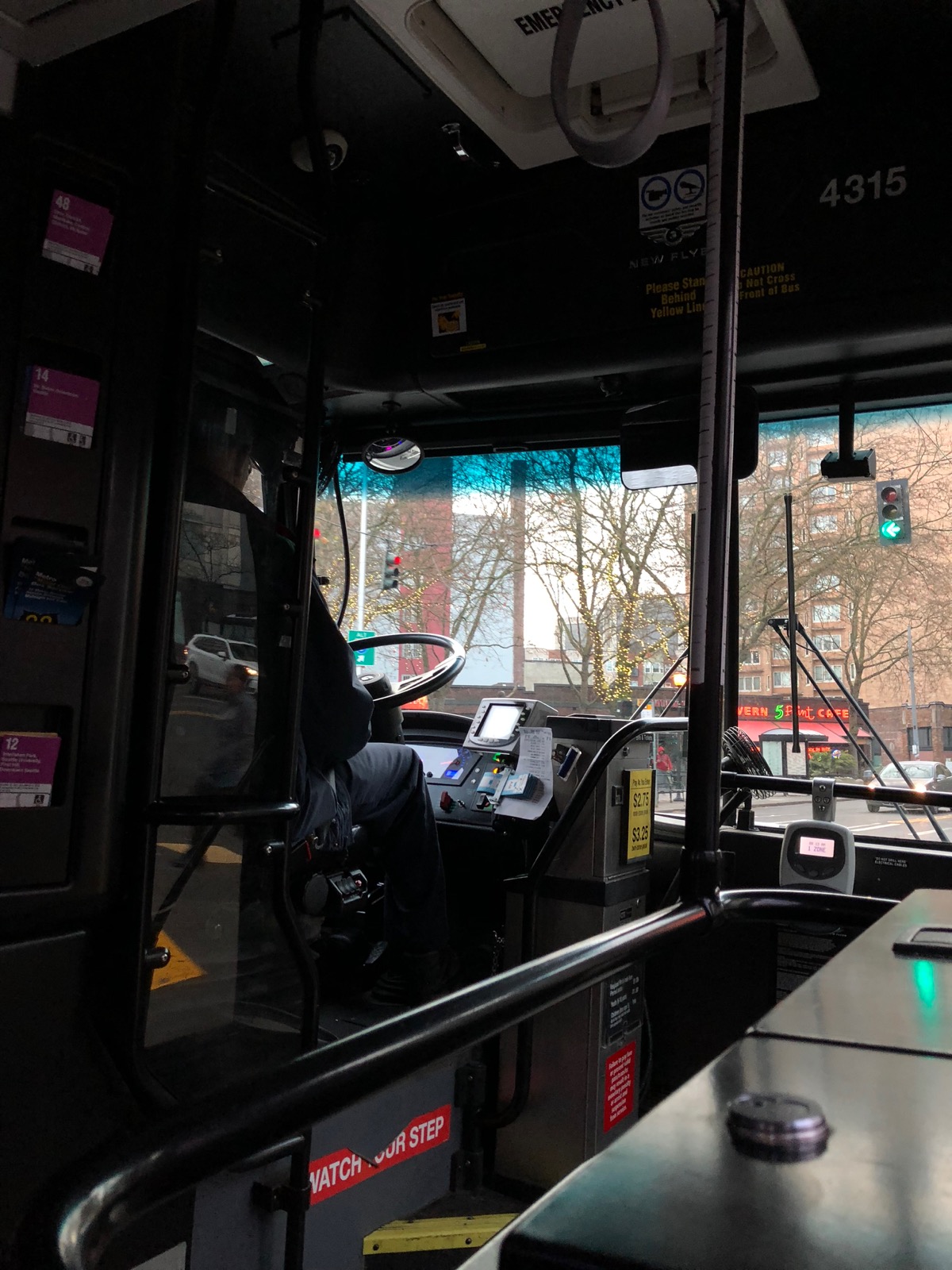
Every time a billionaire complains about public transit, it's like they walked through mud and are showing you the underside of their foot. Their attitude portrays a dream of solitude, this idea that people have a right to live in the world without encountering other people, especially people different than them. It assumes that any system they could build could be enjoyed by anybody who matters.
But for the rest of us, there's public transit. For those who don't want to pay an arm and a leg to park downtown, there's public transit. For people who understand other people there's public transit.
Seattle's mass transit started as streetcars, beginning in West Seattle in 1902. Streetcars ran all over the city — the only remnant of such being the old Seattle waterfront streetcar that was removed when the Seattle Art Museum's Sculpture Park demolished the transit maintenance barn in 2005. That streetcar is expected to return as part of the construction of the 1st avenue Center City Connector, beginning construction next year.
In 1940 or so, the streetcar system was converted to buses, and in 1972 Metro appeared as a consolidation of a number of different systems. Remember the ride free zone? It used to be, on Metro buses, that you could ride through the downtown core for free. That meant there was a novel fare system: if you were headed into downtown in a fare zone, you had to pay while boarding the bus. If you were heading out of downtown, you had to pay leaving the bus. So, if you boarded, say, a #3 on Queen Anne, you paid getting on (then got your transfer so you didn't have to pay again), but you had to show it on your way off the bus on Cherry Hill. It was a weird system.
It's simpler now: pay when you get on, or swipe in with an ORCA card and board on the back doors of one of the main bus lines.
As for the billionaires — well, sure, you do run into people on the bus you want to avoid, but you also get to see a wide swath of humanity you would not be exposed to otherwise. It provides empathy, and also understanding. And, if you're interested in fashion, there's no better way to see the trends of what people are wearing than a daily bus ride.
On one bus alone, there are so many stories. Let's ride that #3 and see who we can find.
Today's prompts
Queen Anne — The McClure middle-school students sat together, five of them clumped in the back of the bus. Maybe they were ditching, it was a time when normally they would be heading towards school, not away from it. Nobody would believe this is what they said, but they actually said this: "Oh my god, you guys, that is hella the bomb," said one, about something, before she leaned in conspiratorially and said "You guys. What's between us, is between us forever."
MoPOP — The bus was crowded, but he had his guitar with him, and it was awkward no matter how you held it. He was coming from an early morning showcase, one chance to play a few songs for a rep before a conference at MoPOP before the museum. "Hey, could you, like, watch that?" said a woman, and he realized he bumped her with his case, right in the behind. "Oh god, I'm sorry," he said. The rep at MoPOP cut him off in the middle of his second song. "We have someone who sounds like you," she said. "Thanks." The bus jerked and he stumbled, his guitar falling over, and slapping the ground with a sickening crunch. Today was just not going well at all.
Belltown — It was the two tech bros in the exit. The bus wasn't even that crowded, they could have moved or sat or done something else besides block the fucking door. "Excuse me," she said when the bus pulled in, and both of them made a lame attempt at pressing, but it was still impossible to squeeze through their backpacks. "I said, excuse me," she said again, stopping. Someone behind her said "Just squeeze through them." She turned, "No. I'm not going to squeeze my body past these inconsiderate assholes. Step off the goddamn bus and make room for people to get on and off, you selfish fucking pricks."
Downtown — Everybody waited at that stop on Cherry Street because that was one steep hill. That's where James was waiting, in the chair. Some people look at him like he doesn't need it, because he pushes with his legs, but that just shows what they know. He doesn't have one of those electric ones, so the old fashioned one is all he gets. This time, the #3 pulls up, and everybody else who doesn't want to walk up that hill to Harborview comes running on in front of him, and the driver has to tell him to wait for the next bus. They already have two chairs on the bus. So he's gonna be late for his appointment, and there's no way around it. He tries not to, but some tears well up and then he feels stupid and punches at the garbage can a few times, just to show he's not some weak fucker who can't take a little disappointment.
Cherry Hill — It was the hardest day she ever had. She'd only worked at the hospital for a few months, but it was no trouble cleaning up and keeping things tidy. Sometimes it got gross, but that was nothing she couldn't handle. That was the job. But the woman today, crying out in pain all day, moaning and screaming and not stopping. They were helping her, she knew they were, but it was so bad. She was trembling and wanted a drink, but had to get home to relieve the sitter. There was no way to process it. Just hope that woman got the help she needed. Hoped she was feeling better.
The Help Desk: The authors of our disappointment
Every Friday, Cienna Madrid offers solutions to life’s most vexing literary problems. Do you need a book recommendation to send your worst cousin on her birthday? Is it okay to read erotica on public transit? Cienna can help. Send your questions to advice@seattlereviewofbooks.com. The following column was originally presented on January 22nd, 2016.
Dear Cienna,
Once, I met an author I loved and it was a total letdown. She was narcissistic and bored by all the people who came out to hear her read, and I disliked her so much it made my skin crawl. Now I can't enjoy her books because it reminds me of how unpleasant she was. Should I bother going to readings anymore? I don't want to lose any more favorite authors, and the risk of them being jerks is scaring me away.
Mary, Bainbridge Island
Dear Mary,
Once, I was invited to a fancy literary party full of very impressive people – best-selling authors, sitcom writers, actors, comedians. I couldn't throw a fork without hitting someone whose work I admired. As parties go, it was normal: People sipped champagne, talked child rearing, traded jokes and were surprisingly tolerant of me sweating on them. I should say, it was normal except for me. Intimidation, my natural dearth of social graces and a near-painful desire to make a good impression rendered me mute – that is, until the hosts' daughter, a sweet-looking girl of about 12, emerged from the kitchen with a plate of fresh-baked chocolate chip cookies and began offering them to guests.
“Mmmm, is there anything better than a cute little girl handing out warm cookies?” One actor asked rhetorically.
That is the moment I found my voice. “Only if she's stripping,” I said.
The actor stared. The child proferred her plate to me with pity in her sweet brown eyes. There was a moment of silence as everyone in the room wished my place were filled by someone who could pass the very low bar of not sexualizing children in casual conversation. That was the day Paul Constant learned that bringing me as his date to parties is like reading Proust to a pig.
I bring up this story, Mary, to illustrate how awful some writers are at interacting with other people. Others are just awful in general (Norman Mailer was a notorious misogynist who once told a crowd of fans that “a little bit of rape is good for the man's soul.”). Either way, you have to separate the person from his or her work and be generous enough to pity them when they act like dicks in public, as all those people pitied me years ago.
Because by their nature, books are a private obsession, both for writers and readers. So attending an author's reading is, to me, an unparalleled act of public intimacy that can go horribly wrong or beautifully right. Personally, I think it's worth wading through a few assholes to experience the beauty.
xoxo,
Cienna
Portrait Gallery: Happy Holidays
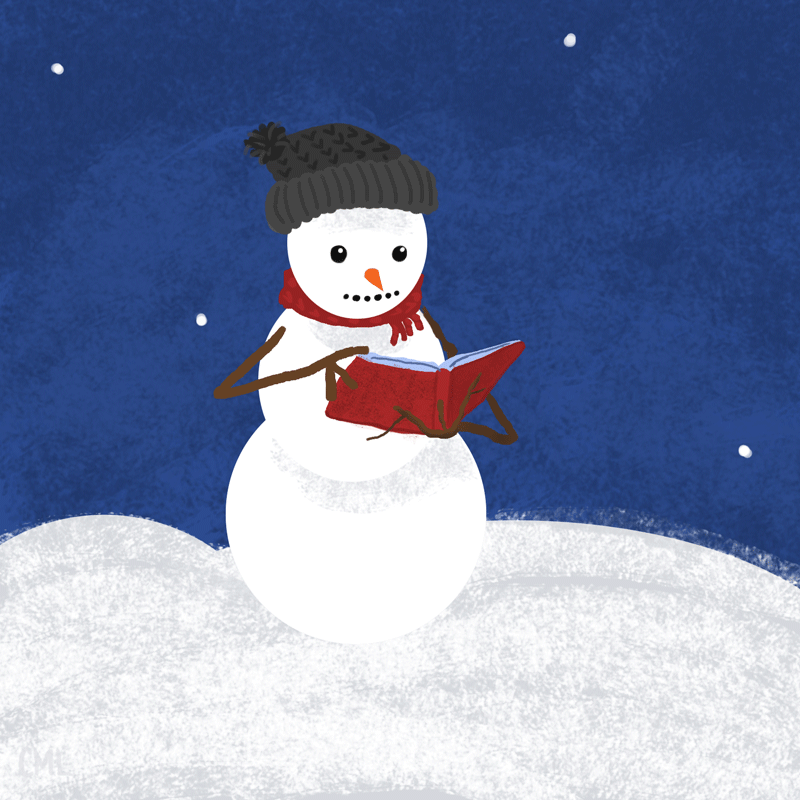
Wishing you and yours
a quiet spot with good light
and plenty of books to read.
Criminal Fiction: Year ending
Every month, Daneet Steffens uncovers the latest goings on in mystery, suspense, and crime fiction. See previous columns on the Criminal Fiction archive page
December heralds best-of-year lists; when it comes to crime fiction, here are a few of my favorites from Irish critic Declan Burke, The New York Times’s Marilyn Stasio, and The Guardian’s Mark Lawson.
Reading around: new titles on the crime fiction scene
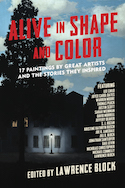
I love the concept of the Lawrence Block-edited anthologies In Sunlight or in Shadow: Stories Inspired by the Paintings of Edward Hopper and Alive in Shape and Color: 16 Paintings by Great Artists and the Stories They Inspired, and I like the implementation even better. For the latter, Lawrence Block organized the participation of a stellar lineup of writers — including Sarah Weinman, Lee Child, Michael Connelly, Nicholas Christopher, Jeffery Deaver and Joyce Carol Oates — and the outcome is a bevy of cool and canny tales that embrace – to name just a few of the topics – art heists, familial relationships, historical intrigue and the seemingly straightforward interactions on a good old-fashioned crime scene. Dip in, dip out, and then dip in yet again. Multiple treasures here.
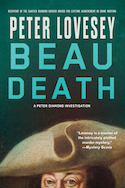
It’s a turn for the history books when a skeleton is discovered wearing 16th Century garb in Peter Lovesey’s Beau Death (Soho): Bath-based Chief Inspector Peter Diamond considers that he may have an age-old mystery on his hands, one involving the city’s most controversial iconic figure, Beau Nash. Diamond’s wry sense of humor stands him in good stead — especially when dealing with the eccentric, arrogant members of a historical society — and the intra-police interactions during the investigation are as enjoyable as the slightly madcap mystery at hand.
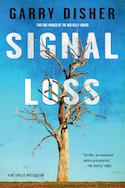
In Signal Loss (Soho), a gloriously gritty Australian-based police procedural, Garry Disher juggles multiple ongoing crime-story strands, leading his detectives on several not-so-merry chases across a dusty, rural backwater. There’s a deeply disturbing meth problem, cold-blooded murder and black-hearted deception — not to mention a slimy serial rapist on the loose. Sergeant Ellen Destry and Inspector Hal Challis and their teams have their hands full, and a striking opening scenario offers up a ghoulish Mr. Wint and Mr. Kidd — that entertainingly deadly duo of Diamonds Are Forever fame — partnership for the 21st century.
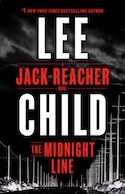
By far the best thing about Jack Reacher novels is that way in which they begin with utter simplicity – Reacher coming across a West Point class ring in a pawnshop, for example – which then evolves into tales of wonderful complexities. The Midnight Line (Delacorte Press) is the perfect example, as Reacher, that class ring in pocket, wends his way across South Dakota and Wyoming, taking in the majestic landscape, collecting friends and enemies along the way, while demonstrating a most impressive use of a tumble dryer. ’Nuff said.
The Quintessential Interview: Joanna Schaffhausen
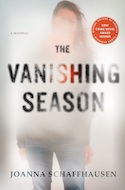
Joanna Schaffhausen’s creepy debut features Ellery Hathaway, a small-town cop who, in years ago, was the sole survivor of a serial killer. Even with her tormentor behind bars, Ellery’s living nightmare returns: for three years running now, someone has vanished from her new hometown, right around Ellery’s birthday. A cunning police procedural as well as a grisly murder mystery by the 2015 Minotaur Books/Mystery Writers of America First Crime Novel winner, The Vanishing Season is one seriously chilling chiller.
What or who are your top five writing inspirations?
- True crime stories
- Reading great writers across all genres
- Travel
- Family — the ties that bind in good and bad ways
- Neuroscience/psychology — all studies of the weird human brain
Top five places to write?
- With my laptop on the bed
- On the train (my commute is 3 hours a day)
- In my head
- At the library where it’s quiet
- In front of a roaring fire
Top five favorite authors?
- Shakespeare
- Fredrik Backman
- Jhumpa Lahiri
- Liane Moriarty
- Ed McBain
Top five tunes to write to?
This would be silence, silence, silence, silence, and silence. I love music but I’m an active listener. If I’m busy paying attention to the songs, I can’t hear the voices in my head. That said, here are five songs I find inspiring as a writer:
- The Hamilton soundtrack
- Beethoven’s Fifth Symphony
- “The Times They Are A-Changin’” by Bob Dylan
- “All These Things That I’ve Done” by The Killers
- “Time After Time” by Cyndi Lauper
Top five hometown spots?
- Boston’s Museum of Science
- The Harbor Islands
- Fenway Park
- Top of the Hub
- Sanders Theatre in Harvard Square
Thursday Comics Hangover: From a roller rink to the stars
Natalie Dupille works along a wide spectrum of cartooning. Her diary comics — as seen in her most recent collection, October Diary — are sketchy and minimalist. It's remarkable the information that Dupille's cartooning can convey in with so little. Look at this image from the cover of October Diary:
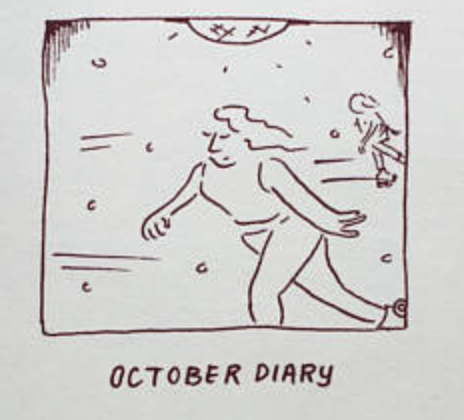
Now consider how amazing it is that your eye can assess that image and immediately determine that it's set at a rollerskating rink when all you can see is exactly six motion lines, an eighth of a disco ball, a single rollerskate wheel, and a background figure. Dupille's entire head on the cover of the book is made up of exactly eight lines: one arrow of a nose, a swooping chin, a concentrating dot of a mouth, two eyes tight in concentration, and then three wavy lines marking her hair flowing in the breeze.
Some might think this rough sketch style of art is simple, but it is in fact inordinately difficult. When you draw with fewer lines, as Dupille does in her diary comics, that creates a tremendous pressure on the artist to make sure that every line is exactly the right line.
The writing in these diary comics is perfectly complementary to the art. Dupille catches a single moment in her day and rounds it out using exactly the right images. She notices how abusive guests at a dinner party behave toward the female voice coming out of an Amazon Echo speaker, for instance, or a blandly inoffensive statement at a corporate meeting can trigger memories of Donnie Darko.
These are tiny moments, but they are titanically tiny moments. They feel neat and self-contained and somehow expansive enough to swallow a reader's brain whole. One page of silent sketches of Dupille's cats and a caption reading "Sad & listening to Graceland on repeat" has somehow taken up residence in my head the way a good pop song does; I'm currently thinking of this strip six to eight times a day.
But there's a flip side to Dupille's work, on the other end of the spectrum from her sketchier comics. Her more rendered work features what appears to be watercolor, adding a delicate and vibrant life to her lines. These painted strips tend to focus on nature and science, and they demonstrate Dupille's boundless curiosity and enthusiasm for learning.
In Huckleberry Pie no.3: Selected Comics 2015-2016, Dupille lays out a two-page spread about the sex lives of banana slugs and earths, and it's a joyous, fun pair of strips. (Banana slugs, she tells us "frequently eat each other's penises after sex. No one really knows why, but we're accepting of most fetishes here in Seattle.") Another, more personal strip details the construction of a cob oven as part of Dupille's attempt to get closer to the land. Readers will find Dupille's attempts to understand the world around her to be infectious; her unabashed geekery is wildly appealing.
Total Lunarchy, a self-described "Zine About Space Dust and Other Important Extraterrestrial Matters," expands Dupille's curiosity into the chilly depths of space. Specifically, she focuses her curiosity on the clingy dust that has plagued the few astronauts we sent to walk on the moon. Lunarchy is about all the things we don't know about the moon. Specifically, she examines why static cling and magnetic fields combine to make the moon inhospitable to our attempts to set up base there.
Dupille is at the top of a very short list of cartoonists who are gifted at explaining science in a fun, approachable way. Lunarchy came out of a collaboration between Dupille and UW research associate professor Dr. Erika Harnett, and hopefully it's not the last foray Dupille will make into the sciences. The universe is complex and confusing; we could use more guides like her to illuminate the darkness with funny and informative cartoons.
Are you following the Moby Dick bot on Twitter? It frequently posts random tweet-sized quotes from the text of Moby Dick, and sometimes it feels eerily appropriate for the day and time. Or maybe it's just that every tweet seems appropriate for the Trump administration.
from hell's heart I stab at thee; for hate's sake I spit my last breath at thee
— Moby Dick (@MobyDickatSea) December 18, 2017
There's something to be said for the synchronicity of a freshly appropriate Melville quote smacking you across the face in your timeline. It's kind of like watching a fin break the surface of the water and knowing that there's something more, something bigger, going on beneath the surface.
Add a personal touch to your holiday shopping at Phinney Books
If you've already picked up our author holiday gift recommendations (thanks again to Anca Szilágyi, Richard Chiem, Bharti Kirchner, and Jessixa Bagley, Richard Chiem, Bharti Kirchner, and Jessixa Bagley for their stellar suggestions) and you're looking for more books to give as gifts, I highly recommend you check out Phinney Books owner Tom Nissley's recommendations:
(And while you're picking up those titles at Phinney Books, please be aware that Seattle author Nicola Griffith has partnered with Phinney Books to provide signed copies of her magnificent Hild and her underappreciated Aud trilogy at bargain prices.)
Looking for a holiday gift book? Jessixa Bagley recommends Louis Undercover
Every Wednesday between Thanksgiving and Christmas, we're asking some of our favorite Seattle authors to recommend the books they're most excited to give as gifts this holiday. Our fourth author is childrens' book author and cartoonist Jessixa Bagley.
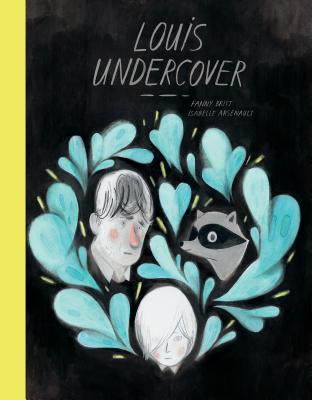
I'm happy to recommend my new favorite book, Louis Undercover by Fanny Britt, illustrated by Isabelle Arsenault. I felt like this graphic novel punched me in the heart. This followup to Jane, the Fox, and Me is a story about a young boy navigating the intense darkness of his parents' recent separation while at he same time experiencing his first love. Both the heartbreaking writing and breathtaking artwork will emotionally level you. Remember to breathe.
Heyyyyy! Looks like 2018 is already guaranteed to be better than 2017: HarperCollins is publishing a long-lost anthropological text written by Their Eyes Were Watching God novelist Zora Neale Hurston in May. Kristian Wilson at Bustle says:
Barracoon is the story of Cudjo Lewis, the last person known to have survived the transatlantic slave trade. The book evolved out of Hurston's interviews with "the Black community of Plateau, Alabama, which was founded by Cudjo Lewis and other ex-slaves from the ship that brought them to America." Based on the author's conversations with the nonagenarian Lewis in the 1920s and '30s, the book covers his life, from his childhood in Africa through the last days of the Civil War. The title refers to the barracks used to hold prisoners in anticipation of the Middle Passage. Hurston completed Barracoon before her death in 1960.
What a fascinating historical document. And what a great time to publish this book!
What Sean Spicer, A Christmas Carol, and Star Wars can teach us about criticism
Last week, Sean Spicer posted this unbelievably stupid commentary on Instagram:
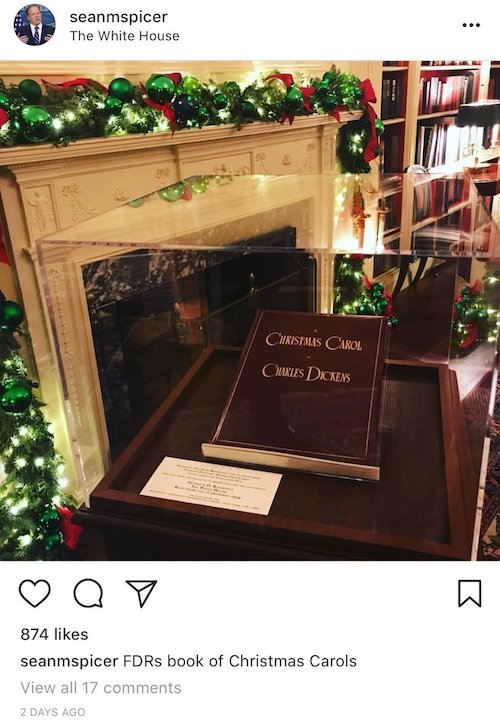
Yes, apparently the idiot former White House spokesperson believes that A Christmas Carol is a book of Christmas carols. (The fact that Spicer, after being roundly mocked by the internet for many hours, changed the caption of his Instagram post to read “FDRs [sic] book [sic] of Dicken’s [sic] Christmas Carol [sic]” didn’t much help matters.)
Spicer’s lack of awareness regarding A Christmas Carol reminded me of this blog post from a decade ago arguing that A Christmas Carol is intrinsically a conservative story. One of the main pieces of evidence in favor of A Christmas Carol as a conservative story is that at the end of the story, "The new Scrooge doesn’t run down the street demanding higher tax rates and that the goverment [sic] do more."
I already made fun of this post back in 2008 when it was first published, so I'm not interested in doing that again. In fact, I think about this post a lot. The truth is, A Christmas Carol is not explicitly a progressive text. To mirror the argument made on that conservative film blog, Scrooge doesn’t run down the street demanding stricter regulations of business or a tighter social safety net, either. He runs down the street trying to be a better person. I personally think that the historical record proves that Dickens was more of a progressive author than a conservative one, but A Christmas Carol doesn’t literally contain any political messages that I recall. “Be more charitable with your time, your spirit, and your wealth” is a universal message, not a partisan one.
But that misreading of A Christmas Carol as a conservative text reminds me of the thieves at my bookstore job who used to try to shoplift Batman comics. When I would chase them down and ask them why they were stealing from a small business — something everyone would agree that Batman would frown upon — they convinced themselves that they were freedom fighters, "liberating" the books from the Evil Empire that is an independent bookstore.
You can convince yourself of anything, is what I'm saying. Very few people see themselves as the villains of their own stories. And very few people love stories that they perceive as being outside their belief systems. So we try really hard to squeeze and contort the narratives that we love in order to fit them into our own worldview.
In a lot of ways, the post about the conservative leanings of A Christmas Carol from 2008 that blew my mind was a precursor to fake news, and evangelicals who voted for Roy Moore supposedly for moral reasons. This is not a new thing. But the support network for these political interpretations is much larger, and much more convincing in the age of Facebook. It’s possible to surround yourself with only people who agree with you, and it’s possible to only see the evidence that supports your thesis. And that’s dangerous.
I don’t want to spoil anything for anyone who hasn’t seen The Last Jedi, but the internet is right now full of pissed-off fans — mostly white, mostly male, mostly middle-aged — who argue that the latest Star Wars movie refutes the film franchise’s straight white male roots. Because they’re so used to seeing straight white males as the protagonist of every film they’ve ever seen, these fans don’t have the imagination to see themselves reflected in the latest Star Wars movie, and so they imagine that the movie is attacking their identity.
So while we’re in this cultural moment, I think it’s important to draw the line between criticism and political demagoguery. I’m not saying that criticism isn’t political. In fact, I think all criticism is in one way or another political. But criticism is about what’s on the page — or, in film criticism’s case, what’s on the screen. The angry white male response to Star Wars, like the misreading of A Christmas Carol I linked to above, isn’t based in the text. It’s about manipulating a text to fit into a worldview and to promote an agenda.
I think it’s useful, every so often, to recommit yourself to the text, to reconfirm that the facts we hold dear are in fact true, and to reaffirm that the ground on which you stand is, in fact, solid. If you read fiction to find heroes, and if the heroes in your fiction don’t challenge your worldview in any way, you’re probably reading wrong. If you open every book hoping to find a perfect mirror inside, you’re doing no more work than poor old Sean Spicer, misreading a book’s cover in a futile effort to seem worldly and wise.
Therapy
I tell my therapist that I do not want to cry
because it’s two in the afternoonand there’s a turtle
sunbathing on a felled treein the marsh outside of her office window.
A Great Blue Heron hobbles close,and it’s probable that the two are holding
a silent confessional barred in by a communityof water lilies that are tethered to mire.
She asks, how I feel when I talkabout home — I hold my rib cage close
to her ear so she can hear the wind howl.
Applications for 2018 Mineral School residencies are open!
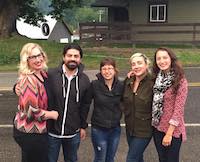
We're delighted to have Mineral School back as a sponsor, though jealous, as always, of the people who'll actually take those residency slots. Check out our sponsorship page for details on the 2018 program, and get a sneak peek at what what Mineral School alumni are publishing next year.
Sponsors like the Mineral School make the Seattle Review of Books possible. Did you know you could sponsor us, as well? If you have a book, event, or opportunity you’d like to get in front of our readers, reserve your dates now.
Shown in photo: Nicole Hardy, Urban Waite, Gretchen Schrafft, Emily May, Gabrielle Bates.
